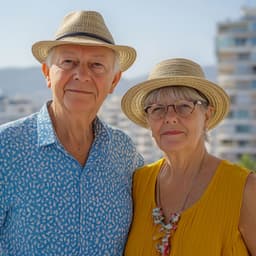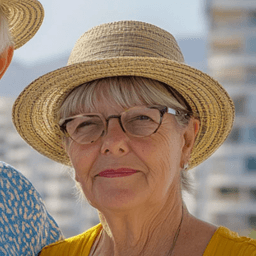If you ask us, taxes in the UK are way too high, especially for retirees, with a rate of 20%. In contrast, Cyprus offers a flat rate of 5%. Quite a difference, isn’t it?
When we discovered this, we couldn’t resist the opportunity to not only move to a warm country but also to reduce our tax burden.
Immigrant Invest supported us throughout the entire process of acquiring Cypriot permanent residence, from selecting our investment destination to moving to Cyprus seven months later.

Rupert and Lucy
Investors and retirees from the UK
Clients’ names and photos have been changed
Investors’ background
Rupert and Lucy, retirees from the United Kingdom, once ran a construction company together. Two years ago, they handed the business over to their elder son, Eric, and began enjoying a stress-free retirement.
The couple wanted to leave the UK due to its unpleasant weather and high cost of living. In Manchester, their monthly expenses amounted to about €3,400, even with a modest lifestyle.
With no strong ties to their former business, Rupert and Lucy were free to relocate. They began searching for a more pleasant place to live.
Eric, familiar with people who had obtained European residency through Immigrant Invest, suggested the company to his parents after reading positive reviews. Trusting their son’s advice, Rupert and Lucy booked a consultation.
Meeting with Immigrant Invest
During their first consultation with an Immigrant Invest expert, Rupert and Lucy outlined their goals and expectations:
-
a country with a lower cost of living than the UK;
-
a place with a warm climate and peaceful environment;
-
an opportunity to invest in real estate, as they planned to relocate.
The couple stated their available budget of around €400,000 and informed Immigrant Invest that they also had an annual retirement income of approximately €78,000.
Several European countries grant residence by investment through property purchases, including Spain, Hungary, Malta, Greece, and Cyprus.
Spain’s minimum investment threshold of €500,000 exceeded the couple’s budget. Hungary was also unsuitable, as property purchases would not qualify for a Golden Visa until January 1st, 2025, and the couple did not want to wait.
Considering Rupert and Lucy’s requirements, Immigrant Invest recommended three suitable options: Malta, Greece, and Cyprus. These countries offer residence by investment through real estate purchases and align with Rupert and Lucy’s preferences for a warm climate and natural surroundings.
The couple’s budget of €400,000 was more than sufficient for each program, as the minimum investment thresholds are:
-
€150,000 — for Malta permanent residence;
-
€250,000 — for a Greece residence permit;
-
€300,000 — for Cyprus permanent residence.
How investors made their final decision
Why not Greece? After declining Spain and Hungary options early in search, Rupert and Lucy also abolished the Greek Golden Visa option.
Despite a favourable tax rate of 7% on foreign-sourced pension income, the Greece Golden Visa has the requirement that properties worth €250,000 be older and in need of renovation. For a new property suitable for immediate relocation, the minimum investment was €400,000, which exceeded the couple’s budget.
That left Malta and Cyprus as the two most suitable options. Both offered permanent residence for life in an English-speaking warm island country with similar living costs.
Why not Malta? Malta has specific requirements for purchasing real estate. Generally, foreigners must obtain an Acquisition of Immovable Property Permit — AIP, which significantly extends the timeline for receiving permanent residence.
The AIP requirement can be waived if foreigners purchase properties in Special Designated Areas. However, most of these properties are still under construction and not ready for immediate occupancy. Besides, it’s mainly investment properties for further lease and earning passive income.
Though Immigrant Invest’s real estate experts could find a suitable real estate option in Malta for the couple, the most important factor that led Rupert and Lucy to decline Malta was the terms for property purchase for permanent residency.
The minimum required price is €300,000, but such properties are limited to less attractive areas of the south of Malta and the island of Gozo with accessibility and underdeveloped infrastructure issues.
The more appealing parts of Malta, such as the northern and central regions, required a minimum investment of €350,000. Considering the additional expenses for taxes, Due Diligence, notary, and administrative fees, the couple feared they would exceed their budget and timeline.
Why Cyprus? After careful consideration, Cyprus emerged as the best option. Real estate costs in the country remained consistent, regardless of location or other factors — €300,000 to qualify for permanent residency, which suited the couple’s budget.
Cyprus’s lack of visa-free access to the Schengen Area did not concern Rupert and Lucy. As UK citizens, they already did not require visas to enter the Schengen Area.
The deciding factor was Cyprus’s fixed 5% tax on foreign retirement income instead of 20% in the UK and complex progressive rules in Malta.
The cost of living in Cyprus is not significantly lower than in the UK. On average, a couple needs about €1,700 per month in Cyprus compared to €1,900 in the UK. However, the 5% personal income tax made a substantial difference.
Ultimately, Cyprus met all of Rupert and Lucy’s requirements. It is a warm country with a pleasant climate, offers residence by purchasing real estate, and, due to its low income tax, has a more affordable cost of living than the UK.
Requirements for obtaining Cyprus permanent residence
To secure permanent residence in Cyprus, investors must contribute at least €300,000 to one of the following asset options:
-
residential or commercial real estate, allowing them to choose one or two properties with a combined value of €300,000;
-
shares in Cypriot companies that employ at least five people;
-
securities in Cypriot investment funds.
In addition to the investment, applicants must demonstrate an annual income of at least €50,000 for the main applicant, with an extra €15,000 for a spouse or €10,000 per child. Rupert and Lucy met this requirement with their combined retirement income of €78,000.
Investors also need to cover the following expenses:
-
an application fee of €500;
-
card issuance fees of €70 per card;
-
a proof of investment fee of €1,000;
-
health insurance, starting at €170 per person.
Real estate investors in Cyprus incur additional costs, including VAT of 19% or 5%, depending on the property, stamp duty of 0.15–0.2% of the property’s value, and a transaction fee of 1% on the investment amount.
Rupert and Lucy’s choice of real estate
Rupert and Lucy chose to purchase residential real estate in Paphos, a coastal town in the southwest of the country. The couple considered it to be the best place to retire in Cyprus. Paphos is a favourite among British expats, with approximately 50% of the approximately 50,000 Britons living in Cyprus residing in the Paphos Town area.
Paphos enjoys a Mediterranean climate with over 300 sunny days a year and mild winters, making it perfect for outdoor activities year-round. The town is surrounded by stunning natural landscapes, including beaches, the Akamas Peninsula, and the Troodos Mountains.
Life in Paphos moves at a relaxed pace, prioritising well-being and quality of life. As a UNESCO World Heritage Site, the town is rich in history and culture, offering ancient ruins, intricate mosaics, and historic monasteries.

Paphos blends ancient history with modern features. Historic landmarks include the Tombs of the Kings, Kato Archaeological Park, and Odeon Amphitheatre, while contemporary attractions include Paphos Marina, scenic coastal areas, and art galleries
Immigrant Invest presented Rupert and Lucy with various villa and apartment options in modern buildings throughout the city.
The couple selected a three-bedroom apartment with a sea view, located near the coast. The residential complex also featured shared amenities, including a garden and parking facilities.
The apartment’s price was €320,000. Since they purchased a single property for personal residence, they qualified for the reduced VAT rate of 5%, totalling €16,000. The stamp duty was 0.2%, amounting to €640.
Examples of properties for purchase in Pahos
Detailed process of obtaining Cyprus permanent residence
The process of obtaining permanent residence in Cyprus for Rupert and Lucy took approximately 7.5 months. Immigrant Invest supported the couple throughout the entire procedure.
In total, Rupert and Lucy spent €341,820.
January 5th, 2024
Preliminary Due Diligence
Preliminary Due Diligence is a mandatory step before signing a contract with investors. Immigrant Invest’s Anti-Money Laundering Department conducts background checks on all applicants.
A Certified Officer verified Rupert and Lucy’s profiles using international databases and online sources. After a successful outcome, Immigrant Invest signed an agreement with the investors.
Preliminary Due Diligence is a mandatory step before signing a contract with investors. Immigrant Invest’s Anti-Money Laundering Department conducts background checks on all applicants.
A Certified Officer verified Rupert and Lucy’s profiles using international databases and online sources. After a successful outcome, Immigrant Invest signed an agreement with the investors.
+ 2 weeks, €340
Preparation of documents
Lawyers provided the investors with a list of required documents, including:
-
valid passports;
-
a marriage certificate;
-
police clearance certificates;
-
biographies;
-
proof of income legality;
-
health insurance, costing €340 for both investors.
The legal team also notarised and apostilled copies and completed the necessary government forms.
Lawyers provided the investors with a list of required documents, including:
-
valid passports;
-
a marriage certificate;
-
police clearance certificates;
-
biographies;
-
proof of income legality;
-
health insurance, costing €340 for both investors.
The legal team also notarised and apostilled copies and completed the necessary government forms.
+ 3 weeks, €340,840
Investment
With Immigrant Invest’s assistance, the applicants selected suitable real estate, and lawyers signed the purchase and sale agreement on their behalf. Immigrant Invest then submitted the property’s documents to the Department of Lands and Surveys in Cyprus.
At this stage, the investors paid VAT, stamp duty, and legal fees for transaction support. They also received a document confirming the investment was made.
With Immigrant Invest’s assistance, the applicants selected suitable real estate, and lawyers signed the purchase and sale agreement on their behalf. Immigrant Invest then submitted the property’s documents to the Department of Lands and Surveys in Cyprus.
At this stage, the investors paid VAT, stamp duty, and legal fees for transaction support. They also received a document confirming the investment was made.
+ 4.5 months, €640
Application and examination
Lawyers submitted the documents to the Civil Registration and Migration Department in Cyprus on behalf of the investors. Rupert and Lucy were not required to visit the country but did need to pay the application and card issuance fees.
The Cypriot authorities reviewed the application for approximately 4 months.
Lawyers submitted the documents to the Civil Registration and Migration Department in Cyprus on behalf of the investors. Rupert and Lucy were not required to visit the country but did need to pay the application and card issuance fees.
The Cypriot authorities reviewed the application for approximately 4 months.
+ 2 weeks
Submission of biometrics
After receiving approval on their application, Rupert and Lucy travelled to Cyprus to provide their fingerprints.
After receiving approval on their application, Rupert and Lucy travelled to Cyprus to provide their fingerprints.
August 17th, 2024
Issuance of permanent residence cards
The residence cards were issued 40 days after biometric submission, and the couple collected them in person.
The residence cards were issued 40 days after biometric submission, and the couple collected them in person.
Investors’ life with permanent residence in Cyprus
With Cypriot permanent residency, Rupert and Lucy moved to Cyprus in the middle of September. They were accompanied by their children, who helped them settle into their new apartment in Paphos and furnish it to feel more like home.
The couple enjoys their new surroundings and the warm local community. Lucy has started attending Greek language courses to integrate more fully, while Rupert has taken up water activities like stand-up paddleboarding and snorkelling, which he now enjoys regularly.
In March, Rupert and Lucy will be eligible for tax residency, having resided in Cyprus for six months by then. Immigrant Invest will assist them in gathering the necessary documents and filing their applications.

Lucy,
Retiree and investor from the UK
Yes, retiring to Cyprus has pros and cons. For instance, Paphos can get crowded with tourists during peak season. However, Manchester had similar issues, as is the case with many attractive cities.
Despite this, I believe Cyprus is a wonderful place to live, and moving here was the best decision we’ve made in years.














